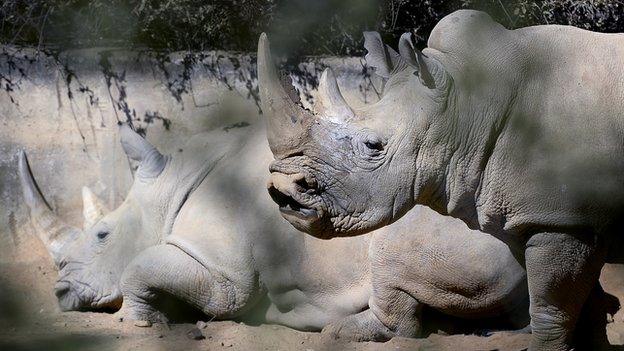Worst year ever for SA rhino poaching
- Published

A total of 1,004 white rhinos were poached last year in South Africa
More white rhinos were illegally killed in South Africa in 2013 than in any previous year, according to government figures.
A total of 1,004 animals were poached, representing a 50% increase over the previous 12 months.
Campaigners say that a growing demand for rhino horn from markets in Vietnam and China is fuelling the killing.
They are concerned that illegal hunting on this scale threatens the survival of the species in the long term.
The White Rhino is one of the world's greatest conservation success stories. At the end of the 19th century there were just 100 alive in South Africa. Today there are around 20,000 according to experts.
But in recent years, the rapid rise of poaching has threatened to undermine the good work.
In 2007, only 13 rhinos were killed in South Africa for their horns; in 2013, it was almost three a day, external.
Campaigners say that they are concerned that at this rate, the number of deaths will soon surpass births leading to an inevitable decline.
Prized commodity
"The experts tell me we are not quite yet at the tipping point but we are very close to it," Tom Milliken from Traffic International told BBC News.
"If this kind of attrition is sustained for much longer we are definitely going to see South Africa's rhinos go into decline for the first time in a hundred years."
There are a number of factors that are driving the increase in numbers. In Vietnam and China, the horn is believed to have medicinal properties and is also seen as a status symbol.
It can sell for up to $65,000 per kilogramme, making it more expensive than gold or cocaine.
Much of the killing takes place in South Africa's Kruger National Par which borders Mozambique. This impoverished nation is believed to be an operational base for the organised criminal gangs who poach and distribute the horn to Asia.
Despite the police and military resources that South Africa has applied to the problem, the killing has increased.
"South Africa has a 230km porous border with Mozambique that presents a huge challenge, but there are other issues at play," said Tom Milliken.
"One wonders if it is really possible to kill over 1,000 rhino if there isn't some degree of collusion and internal corruption that is going on?"
Porous border
Another factor that has exacerbated the killing in recent years is the granting of sporting licences for the export of rhino horns. The system was widely abused with many people travelling from Asia to acquire the horns and selling them on their return.
Last year, the Convention on the International Trade in Endangered Species (Cites) attempted to curtail the trade by demanding action from Vietnam and Mozambique.
The Vietnamese are due to report by the end of this month on their efforts to improve arrests, prosecutions and seizures. Mozambique has been asked to significantly increase penalties for dealing in rhino parts.
In February, the UK will host a high profile summit to try and tackle the illegal trade in wildlife.
The killing in South Africa though shows no signs of slowing down, with 37 rhinos already poached in the first two weeks of this year.
Follow Matt on Twitter, external.
- Published16 October 2013
- Published30 October 2011
- Published3 November 2011